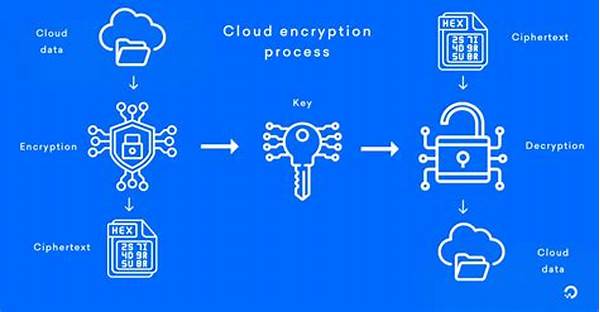In an era where data security is paramount, organizations are increasingly shifting towards sophisticated solutions that ensure data integrity, confidentiality, and accessibility. Cloud-based encryption key management emerges as a pivotal solution in this domain. By leveraging the cloud’s expansive capabilities, it offers a robust framework for managing encryption keys, which are critical for protecting sensitive information from unauthorized access.
Read Now : Post Method In Rest Api
The Importance of Cloud-Based Encryption Key Management
Cloud-based encryption key management has become a cornerstone for organizations aiming to safeguard their data. With the proliferation of data breaches and cyber threats, maintaining stringent control over encryption keys is essential. This approach allows organizations to store, manage, and rotate encryption keys in a secure environment, mitigating the risks associated with unmanaged or improperly handled keys. By employing cloud-based encryption key management, organizations benefit from enhanced security features, such as automated audits, detailed logging, and compliance with stringent data protection regulations. Furthermore, this solution allows for seamless scalability, ensuring businesses can adjust their key management strategies in line with their growth.
Key Features of Cloud-Based Encryption Key Management
1. Centralized Key Control: Cloud-based encryption key management provides a centralized platform for managing keys, enabling easier oversight and reducing the risk of key leakage.
2. Automated Key Rotation: This feature ensures that encryption keys are automatically rotated at regular intervals, enhancing security by minimizing exposure time.
3. Regulatory Compliance: With cloud-based encryption key management, adherence to international data protection standards, such as GDPR and HIPAA, becomes streamlined, reducing legal risks.
4. Scalability: The cloud infrastructure allows organizations to scale their encryption key management solution according to their evolving needs, without compromising security.
5. High Availability: Ensures that encryption keys are accessible at all times, supporting uninterrupted data protection processes across various applications and services.
Challenges in Implementing Cloud-Based Encryption Key Management
Despite the advantages, implementing cloud-based encryption key management presents its own set of challenges. One primary concern is the potential dependency on external service providers, which may introduce vulnerabilities if not properly vetted. Organizations must conduct thorough due diligence to ensure that their chosen provider adheres to the highest security standards and practices. Another challenge is the integration of cloud-based encryption key management solutions with existing IT infrastructure. This requires careful planning and coordination to ensure compatibility and optimal functionality. Additionally, businesses must remain vigilant about potential security threats that could exploit weaknesses in their cloud environments.
Best Practices for Cloud-Based Encryption Key Management
1. Provider Evaluation: Conduct comprehensive evaluations of cloud service providers to ensure their security protocols meet organizational standards for cloud-based encryption key management.
2. Regular Audits: Implement routine security audits and assessments to identify and rectify any vulnerabilities in the encryption key management process.
3. Access Control: Establish strict access controls to limit exposure of encryption keys to authorized personnel only, minimizing the risk of insider threats.
4. Training and Awareness: Invest in ongoing training programs for IT teams to stay informed about the latest trends and threats related to cloud-based encryption key management.
Read Now : Visualization Tools For Data Analysis
5. Incident Response Planning: Develop and regularly update incident response plans to address potential breaches in encryption key management swiftly and effectively.
6. Data Segmentation: Use segmentation strategies to isolate encryption keys, further protecting them from unauthorized access and potential breaches.
7. Strong Encryption Standards: Adhere to industry best practices for encryption, ensuring robust data protection in line with the latest technological advancements.
8. Multi-Factor Authentication: Implement multi-factor authentication processes to provide an additional layer of security for encryption key access.
9. Tokenization: Consider using tokenization alongside encryption to mask sensitive data, adding an extra layer of security to cloud-based encryption key management.
10. Continuous Monitoring: Leverage continuous monitoring tools to detect and respond to security incidents related to encryption keys in real-time.
Future Trends in Cloud-Based Encryption Key Management
The future of cloud-based encryption key management is poised for innovation, driven by the need for more sophisticated security solutions. Advances in artificial intelligence and machine learning are set to revolutionize how encryption keys are managed, offering predictive analytics and automation capabilities that enhance security measures. Organizations can expect an increase in the adoption of zero-trust architectures, which prioritize identity verification at every stage of data access. Additionally, the integration of blockchain technology promises to offer immutable and decentralized methods for tracking and managing encryption keys in the cloud. As these trends unfold, businesses must remain agile and adapt to new technologies to maintain robust cloud-based encryption key management systems.
Conclusion: Securing Data in the Cloud
In conclusion, cloud-based encryption key management plays a critical role in the digital security landscape. By harnessing the cloud’s scalability and advanced features, businesses can protect their sensitive data against a backdrop of growing cyber threats. However, it is crucial for organizations to adopt strategic measures, such as choosing the right service provider, implementing best practices, and staying informed about emerging trends. By doing so, companies can ensure that their encryption key management strategies remain robust, enabling them to secure their data and maintain trust with customers and stakeholders alike.
Summary: Cloud-Based Encryption Key Management Essentials
Cloud-based encryption key management serves as an essential component in modern data security strategies. By centralizing the management of encryption keys in the cloud, organizations can ensure that their data remains protected from unauthorized access. This solution provides scalability, regulatory compliance, and enhanced security features that are vital in today’s digital environment. However, businesses must be aware of the challenges involved, including reliance on service providers and integration with existing infrastructure. To overcome these hurdles, adopting best practices and staying abreast of technological advancements in encryption and security is critical. The future trends in cloud-based encryption key management, such as AI integration and blockchain adoption, highlight the evolving landscape and emphasize the need for continuous improvement in security strategies. Through careful planning and execution, companies can achieve robust data protection, safeguarding their interests and upholding their commitment to data integrity and confidentiality.
